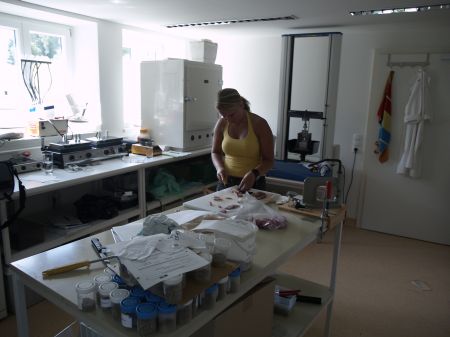For consumers, the sensory properties (tenderness, juiciness, taste) of meat are crucial when purchasing meat. In addition to subjective assessment through tasting, meat tenderness can be determined objectively using shear force measurement (Warner Bratzler Scherblatt).
The present project is carried out in cooperation with Rewe, Ja! Done naturally; The work in the laboratory is carried out by Ms. Grießler, intern at Rewe, Yes! Naturally handled.
In the present project, the meat tenderness of 24 young cattle is examined using Instron shear force measurement. The 24 animals selected should be between 9.5 - 11.5 months old and have a slaughter weight of 190 - 240 kg. For this purpose, meat samples from Yes! are taken at the cutting plant. Naturally, young cattle were raised and sampled at three different times of maturity (4, 14 and 24 days post-mortem). The samples (a total of 15 cm per young cattle) are taken from the back muscle (Musculus longissimus dorsi) caudally from the 11th rib and matured in a vacuum bag at 2 degrees Celsius. The shear force measurement is carried out on raw and grilled meat. The aim of the project is to estimate to what extent the tenderness of young beef can be improved through longer meat maturation.
According to experts, the production of young beef from suckler cows will increase in grassland and mountain areas. The results provide slaughterhouses, butchers, butchers, retailers and consumers with valuable information about the effect of an extended ripening period on meat tenderness. The results of the project are also of interest to farmers who market their beef directly from the farm. The project provides the Austrian quality programs (AMA quality seal, quality fattening calf, organic ox, etc.) with a decision-making aid as to the extent to which a longer maturation period, which also entails higher costs, is profitable.
Further information on project management can be found in the database for research and sustainable development (Dafne) -> Link







